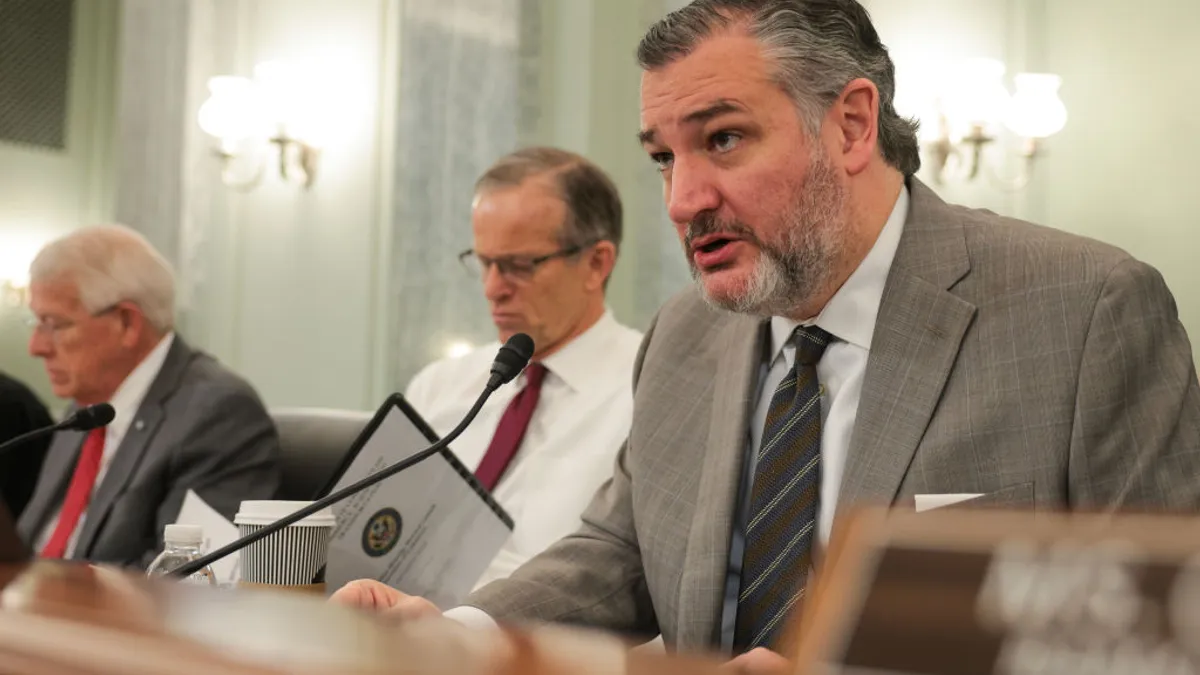Dive Brief:
- A proposed 10-year moratorium on artificial intelligence regulation at the state level cleared a key procedural hurdle in the U.S. Senate on Saturday, a senior member of the Senate Budget Committee announced.
- Republican proponents of the controversial proposal are seeking to advance it as part of the Senate’s version of major tax-cut and spending legislation, dubbed the “One Big Beautiful Bill Act” by the House, which lays the foundation for much of President Donald Trump’s domestic agenda.
- Despite concerns from Democrats, the Senate Parliamentarian has determined the AI provision does not violate the Senate’s “Byrd rule” and can therefore remain in the bill, according to a press release issued by Sen. Jeff Merkley, D-Ore., the Senate Budget Committee’s ranking member. The rule prevents the Senate’s budget reconciliation process — intended for easing passage of priority tax and spending bills — from being used for unrelated policy changes.
Dive Insight:
The moratorium push comes as AI rules and legislative proposals are rapidly piling up across states, creating a complex regulatory environment for businesses.
“A patchwork of state and local regulations will hit hardest on small businesses who do not have the resources to successfully navigate various and conflicting state and local rules,” a coalition led by the U.S. Chamber of Commerce said in a June 9 letter to Senate members.
A quarter of small business owners aren’t deploying AI tools because of concerns about legal or compliance issues, the letter said, citing a recent Chamber report.
More than 1,000 AI-related bills have already been introduced at the state and local levels this year alone, according to the letter, which urged support for a regulatory freeze. Opponents of the proposed moratorium include the National Conference of State Legislatures.
Last month, the House passed a version of the spending bill with a provision to pause state AI regulation. Before reaching the president’s desk for his signature, the massive tax and spending legislation must still be passed by the Senate, and the two congressional chambers must resolve any differences between their versions of the bill.
“We continue to see Republicans’ blatant disregard for the rules of reconciliation when drafting this bill,” Merkley said in his release. “Republicans’ relentless attack on middle class families in order to fund tax breaks for billionaires is a slap in the face to working families everywhere, and Democrats are fighting back.”
The release noted that Democrats succeeded in getting some provisions blocked under the Byrd rule, including proposed limits on certain grant funding for “sanctuary cities” where the U.S. Justice Department disagrees with immigration enforcement by states and localities. Other items blocked in recent days include a provision that would eliminate the Public Commpany Accounting Oversight Board, though it could be modified to make it compliant, CFO Dive previously reported.
Under the Byrd rule, any U.S. senator may raise a point of order against a provision on the grounds that it violates the rule. If the Parliamentarian deems the provision to be out of order, that ruling can be waived by a 60-vote supermajority of senators. The Senate currently has a 53-seat Republican majority.
The Parliamentarian’s decision on the AI provision was welcomed by Senate Commerce Chairman Ted Cruz, R-Texas, a chief proponent of the language.
“The provision is very simple,” he said in an emailed statement. “As a condition of receiving a portion of a new $500 million federal investment to deploy AI, states that voluntarily seek these funds must agree to temporarily pause AI regulations and use the funding in a cost-efficient manner. History has shown that this light-touch regulatory approach to new technologies has been incredibly successful in promoting American innovation and jobs.”
However, the AI provision is facing backlash from lawmakers on both sides of the aisle, including Trump allies like Sen. Marsha Blackburn, R-Tenn.
“We cannot prohibit states across the country from protecting Americans, including the vibrant creative community in Tennessee, from the harms of AI,” Blackburn said in an emailed statement.














